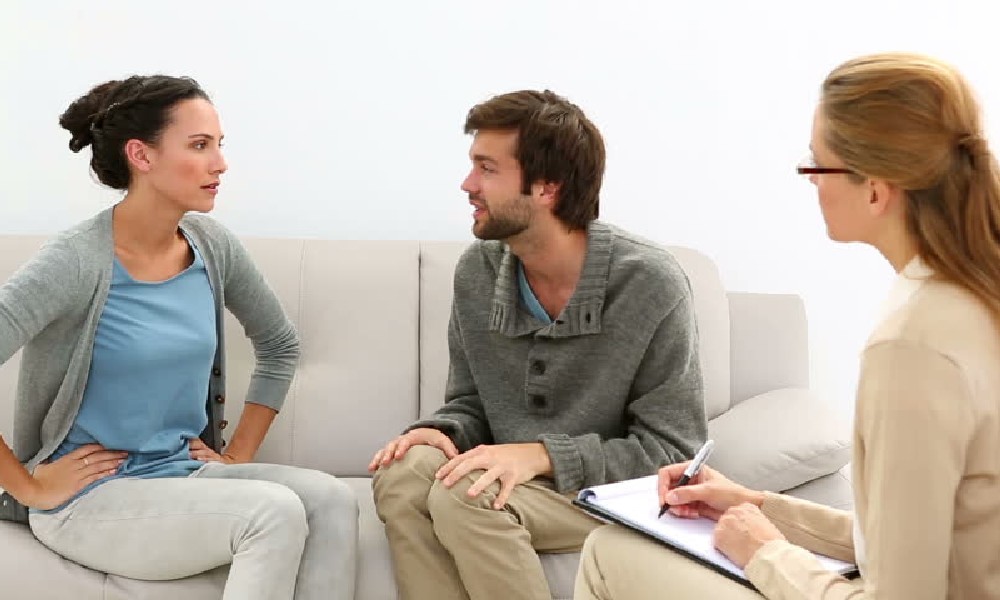Emotional Couple Therapy
some key elements of emotional-focused couple therapy

Marzieh Ahankoob Nejad
Clinical counselor
emotional couple therapy
Here are some key elements of emotional-focused couple therapy:
Attachment-Oriented Approach
– Focuses on identifying attachment styles and how they impact the relationship dynamics
– Aims to foster a secure emotional bond and sense of safety between partners
Emotion-Focused Interventions
– Helps couples express, explore, and regulate their emotions in a constructive way
– Encourages emotional vulnerability and acceptance within the relationship
Experiential Exercises
– Uses in-session tasks and interactions to observe and address emotional patterns
– May involve role-playing, visualization, or other interactive techniques
Empathic Responding
– Therapist models and teaches partners how to actively listen and validate each other’s feelings
– Facilitates mutual understanding and compassion
Reprocessing Emotional Injuries
– Identifies and works through past hurts, betrayals, or attachment ruptures
– Helps couples heal and rebuild trust
Enacting Softer Emotions
– Encourages partners to express underlying emotions like sadness, fear, and longing
– Rather than defensiveness or hostility during conflicts
Strengthening Emotional Accessibility
– Helps partners become more open, responsive, and attuned to each other’s emotional needs
Developing Shared Meaning
– Explores the couple’s history, values, and vision for their relationship
– Aligns partners around a sense of shared purpose and intimacy

The ultimate goal is to create a safe, empathetic environment where partners can learn to better understand, soothe, and emotionally engage with one another. This lays the foundation for more fulfilling and secure relationships.
How can emotional-focused couples therapy help address communication challenges in my relationship?
Emotional-focused couples therapy can be highly effective in addressing communication challenges by targeting the underlying emotional dynamics between partners. Here are some of the key ways this approach can help improve communication:
Enhancing Emotional Awareness
– The therapist works with the couple to increase their self-awareness and ability to identify their own emotions.
– Partners learn to recognize and express feelings like sadness, fear, and vulnerability, rather than defaulting to more defensive emotions.
Fostering Empathic Responding
– Therapists model and teach active listening skills, helping partners develop the capacity to attune to and validate each other’s emotional experiences.
– This emotional attunement lays the groundwork for more open, compassionate communication.
Regulating Emotional Reactivity
– Couples learn strategies to manage intense emotions and de-escalate conflict before it becomes destructive.
– Techniques like mindfulness, emotion-focused problem solving, and healthy conflict resolution skills are practiced.
Repairing Emotional Injuries
– The therapist guides the couple in openly addressing past hurts, betrayals, or attachment ruptures that may be fueling current communication breakdowns.
– Partners learn to express their pain and forgive in a way that strengthens their emotional bond.
Enhancing Accessibility and Responsiveness
– Couples are encouraged to become more emotionally open and vulnerable with each other in session.
– As partners feel safer to share their innermost feelings, their communication naturally becomes more authentic and intimate.
Co-Creating Shared Meaning
– The therapist helps the couple reflect on their relationship history, values, and vision for the future.
– This alignment around a common purpose and understanding can significantly improve the quality of their communication.

By targeting the emotional foundations of communication, emotional-focused couples therapy empowers partners to have more meaningful, productive, and satisfying dialogues. Over time, these skills become deeply ingrained, transforming the couple’s entire interaction patterns.
What are some specific communication techniques I can learn in emotional-focused couples therapy to improve my relationship?
Here are some specific communication techniques that are often taught in emotional-focused couples therapy to improve relationship dynamics:
Emotional Sharing:
– Partners take turns sharing their feelings and emotional experiences using “I” statements (e.g. “I feel hurt when…” rather than “You made me feel…”)
– The listener responds with empathy and validation, not defensiveness
Reflective Listening:
– One partner shares their perspective, then the other partner reflects back what they heard to ensure mutual understanding
– This demonstrates active listening and a commitment to comprehending your partner’s point of view

Soften Startup:
– When initiating a discussion about a sensitive topic, partners learn to use a gentle, non-blaming tone
– This helps prevent the interaction from immediately escalating into a harsh or critical exchange
De-Escalation Strategies:
– Couples practice techniques like taking breaks, using “time outs,” and shifting the conversation when things start to feel emotionally overwhelming
– This allows partners to self-soothe and re-engage from a calmer state
Expressing Needs and Wants:
– Partners learn to clearly articulate their underlying needs and desires, rather than making demands or accusations
– This paves the way for more productive problem-solving and compromise
Validation and Empathy:
– Couples are taught to respond to each other’s emotions with acceptance and compassion, even if they don’t fully agree
– Validating each other’s feelings helps strengthen the emotional bond
Repairing Ruptures:
– Partners develop scripts for making meaningful apologies and taking responsibility for their part in conflicts
– This helps mend emotional injuries and rebuild trust over time
The therapist guides the couple in practicing these skills within the safety of the session, then encourages them to apply the techniques at home. With consistent effort, these communication tools can transform how partners relate to one another.
What are some common challenges couples face when implementing these communication strategies?
Couples often face several common challenges when trying to implement the communication strategies learned in emotional-focused couples therapy. Here are some of the key obstacles they may encounter:

Ingrained Habits and Patterns:
– Negative communication habits like criticism, defensiveness, and stonewalling can be deeply ingrained over years or decades.
– Breaking these patterns and replacing them with new skills requires significant and consistent practice.
Emotional Reactivity:
– When discussions touch on sensitive topics, partners may quickly become flooded with intense emotions that derail the conversation.
– Learning to self-soothe and regulate emotional reactivity takes time and ongoing effort.
Vulnerability and Trust:
– Expressing vulnerable emotions and needs requires a level of trust that may not yet exist in the relationship.
– Building this emotional safety and intimacy is a gradual process that the therapy aims to facilitate.
Differences in Communication Styles:
– Partners may have grown up with very different norms and expectations around how to communicate effectively.
– Reconciling these differences and finding a mutually understanding style is challenging.
External Stressors:
– Factors like work, finances, family obligations, or other life stressors can make it difficult to consistently apply the new communication skills.
– Maintaining the practices requires dedicated time and energy that couples may struggle to prioritize.
Resistance to Change:
– One or both partners may be reluctant to let go of familiar (even if unhealthy) interaction patterns.
– Overcoming this resistance and embracing a willingness to change requires significant commitment.
Therapist Dependency:
– Couples may come to over-rely on the therapist’s guidance and struggle to independently apply the strategies at home.
– Developing self-sufficiency in utilizing the techniques is an important part of the therapy process.
The therapist’s role is to acknowledge these barriers, provide support, and equip the couple with tools and techniques to overcome them. With ongoing practice and perseverance, couples can make meaningful and lasting changes to their communication patterns.
Finding Freedom from Anorexia: A Compassionate Guide to Treatment
Finding Freedom from Anorexia:A Compassionate Guide to Treatment Anorexia is...
Read MoreHow to Treat Bulimia: Therapy, Medication & Recovery Tips
How to Treat Bulimia:Therapy, Medication & Recovery Tips Looking for...
Read MoreHow to Overcome Fear: Proven Treatment Options That Work
How to Overcome Fear: Proven Treatment Options That Work Explore...
Read More


